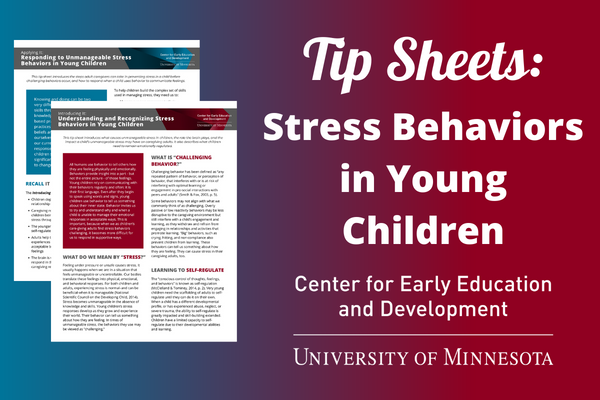These tip sheets explore causes of unmanageable stress in children and its impact on caregiving adults. They delve into the role of the brain and what children need to remain emotionally regulated. They also provide information on preventing stress in a child before challenging behaviors occur and responding when they do.
Our evidence-based tip sheets for early childhood professionals break topics down into two parts: theory (Introducing It) and practice (Applying It). This set of tip sheets introduces causes of unmanageable stress in children, the role the brain plays, and the impact a child’s unmanageable stress may have on caregiving adults. It also describes what children need to remain emotionally regulated. Finally, it introduces the steps adult caregivers can take in preventing stress in a child before challenging behaviors occur, and how to respond when a child uses behavior to communicate feelings. Download these free resources and make sure to check out our other tip sheets.
References
1. National Scientific Council on the Developing Child. (2014). Excessive stress disrupts the development of brain architecture. Journal of Children’s Services, 9(2), 143-153.
2. Smith, B., & Fox, L. (2003). Systems of service delivery: A synthesis of evidence relevant to young children at risk of or who have challenging behavior. Center for Evidence-based Practice: Young Children with Challenging Behavior.
3. McClelland, M. M., & Tominey, S. L. (2014). The development of self-regulation and executive function in young children. Zero to Three, 35(2), 2-8.
4. Murray, D. W., Rosanbalm, K. D., Christopoulos, C., & Hamoudi, A. (2015). Self-regulation and toxic stress: Foundations for understanding self-regulation from an applied developmental perspective. OPRE Report #2015-21, Washington, DC: Office of Planning, Research and Evaluation, Administration for Children and Families, U.S. Department of Health and Human Services.
5. National Scientific Council on the Developing Child. (2020). Connecting the brain to the rest of the body: early childhood development and lifelong health are deeply intertwined: Working Paper No. 15.
6. Colvin, G. (2004). Managing the cycle of acting-out behavior in the classroom. Eugene, OR: Behavior Associates.
7. Gearity, A. (2009). Developmental repair: A training manual. Washburn Center for Children.
8. Watson, C. and Hanson, S. (2018, June). Bridging Education and Mental Health Frameworks. MN Early Intervention Summer Institute. Adapted from Colvin, G., 2004.




